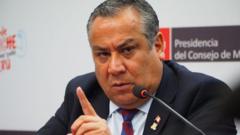Adrianzén's resignation highlights the continuing struggles of President Dina Boluarte, whose administration is already facing severe scrutiny as crime rates escalate. With this being Adrianzén's exit, he becomes the third prime minister to serve under Boluarte, further deepening the challenges surrounding her presidency.
Peru's constitutional framework dictates that a prime minister's resignation necessitates the resignation of the entire cabinet. As a result, Peru now faces the impending task of revamping its political leadership once again. This shake-up comes closely on the heels of a cabinet reshuffle where Boluarte had recently appointed new ministers for finance, interior, and transport—who are now also compelled to resign alongside Adrianzén.
Public discontent is palpable, as demonstrators have taken to the streets demanding action against escalating crime and extortion that plague their communities. Many Peruvians, frustrated with the government's inability to address these pressing issues, are expressing their grievances through protests, branding placards that call out for an end to the violence. This backdrop exacerbates the political challenges faced by Boluarte, who ascended to the presidency following the impeachment of her predecessor, Pedro Castillo, and has since seen her approval ratings dwindle amid the ongoing crises.
As Peru navigates this political turmoil, the question remains: can Boluarte stabilize her government and regain the trust of a populace increasingly desperate for effective leadership?
Peru's constitutional framework dictates that a prime minister's resignation necessitates the resignation of the entire cabinet. As a result, Peru now faces the impending task of revamping its political leadership once again. This shake-up comes closely on the heels of a cabinet reshuffle where Boluarte had recently appointed new ministers for finance, interior, and transport—who are now also compelled to resign alongside Adrianzén.
Public discontent is palpable, as demonstrators have taken to the streets demanding action against escalating crime and extortion that plague their communities. Many Peruvians, frustrated with the government's inability to address these pressing issues, are expressing their grievances through protests, branding placards that call out for an end to the violence. This backdrop exacerbates the political challenges faced by Boluarte, who ascended to the presidency following the impeachment of her predecessor, Pedro Castillo, and has since seen her approval ratings dwindle amid the ongoing crises.
As Peru navigates this political turmoil, the question remains: can Boluarte stabilize her government and regain the trust of a populace increasingly desperate for effective leadership?





















